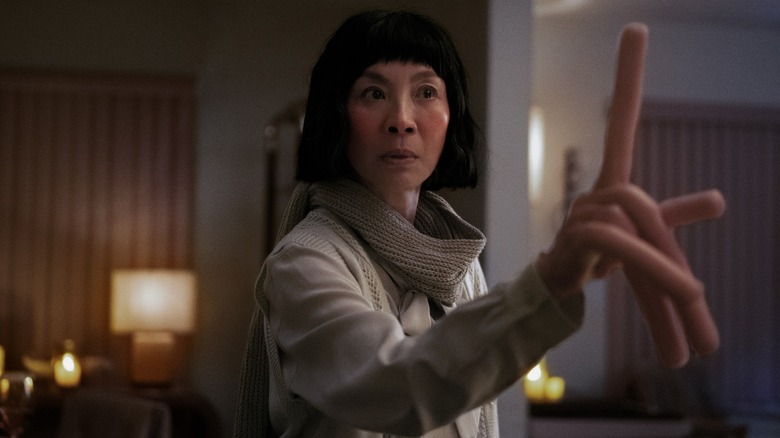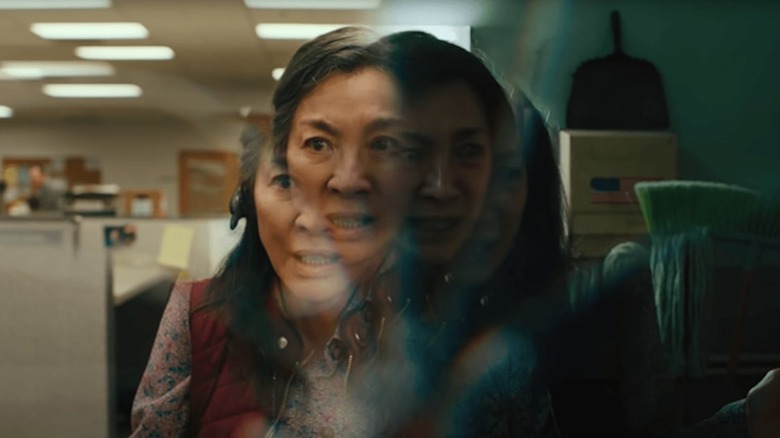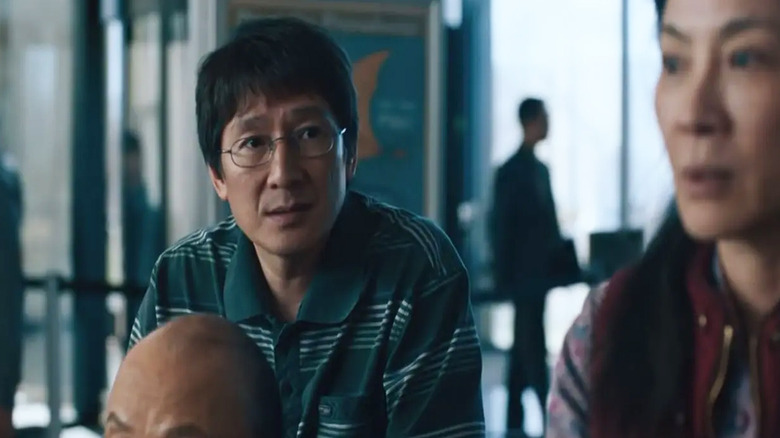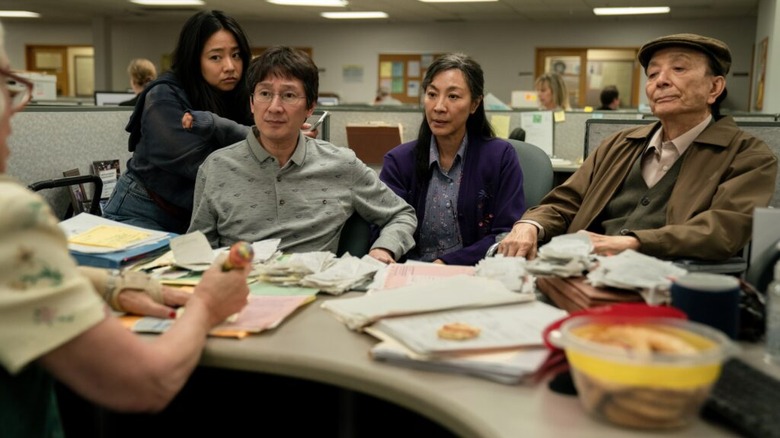Everything Everywhere All At Once Ending Explained: Find Kindness In The Chaos
"Everything Everywhere All At Once" is a difficult movie to explain in a succinct manner. It might even be a difficult movie to explain in any manner since it's so weird. But seeing as our "Ending Explained" articles are the prefect place to untangle the theatrical equivalents of the Gordian knot for the benefit of you, our dear readers, I'll try my best.
On the surface, the film is a larger than life cinematic experience about a Chinese immigrant who gets pulled out of her own bubble — filled with family drama, laundry, and taxes — and into the multiverse in order to save it from Jobu Topaki, an omniversal being with unfathomable power. Once you dig deeper through the surreal, invigorating, and truly absurd layers contained within the parallel universes that Evelyn Wang inhabits, you find a poignant tale about generational trauma and how that can affect a family.
This sci-fi action comedy written and directed by Dan Kwan and Daniel Scheinert (aka the filmmaking duo known as Daniels) is a lot. However, despite all the chaos, it's well worth the ride for one of the best movies of the year. And since it's really one of those movies that sticks with you well after the credits roll, let's do our best to simplify the complex narrative themes and figure out what it all means.
From this point forward, there will be massive spoilers for "Everything Everywhere All At Once." Please proceed with caution if you have not seen the movie.
My clay pot is leaking
Before we explain the end of this movie, we need to establish how everything works first. Michelle Yeoh's Evelyn is able to travel through the multiverse thanks to a process called "verse-jumping." Her counterpart from the Alphaverse created this technology so that people in her universe could tap into the skills, memories, and bodies of their parallel selves. It's triggered by random acts like eating lip balm, snorting a fly, or leaping onto a butt-plug-shaped trophy. The more random the act, the more power is created to jump to abilities located in further universes.
The Alphaverse version of her husband Waymond, who is played by the incomparable "Indiana Jones and the Temple of Doom" and "The Goonies" star Ke Huy Quan, introduces our protagonist Evelyn to the tech after his team searched far and wide throughout the multiverse to find the version of her that could mentally handle the strains that verse-jumping puts on someone's brain, which are similar to the cracks that form on an overfilled clay pot.
Since this Evelyn is basically (in Alpha Waymond's words) living her worst life, she is capable of anything because she's so bad at everything. We get a glimpse into this when Jamie Lee Curtis' IRS auditor Deirdre questions a number of expenses such as a karaoke machine and watsu massage paraphernalia and asks what they have to do with running a laundromat. Waymond responds by saying that Evelyn mistakes her hobbies for potential careers. It's the age old adage "Jack of all trades, master of none" brought to life.
But because this Evelyn is not beholden to one path in her life and possesses a plethora of untapped potential, she is somehow more susceptible to whatever mental capacity is necessary for verse-jumping, and can utilize the expanded lung capacity of the version of herself that's a singer, the martial arts stylings of her famous action movie star self, or whatever it is she needs from her counterpart from a world where humans evolved with long, limp, hot dog-like fingers, to defeat the all-powerful threat consuming the multiverse.
Small, stupid humans
The reason that Alpha Waymond and his team have been looking for this Evelyn is because they need her help to subdue the reign of terror caused by the nihilistic Jobu Topaki. Armed with the mantra of "nothing matters" and an everything bagel that has evolved into a powerful black hole, Jobu has been destroying universes as she also searches for an Evelyn that fits her ultimate plan. However, though many think that her search is to take out the Evelyn that could stop her, she was actually looking for someone else who could harness the powers of the multiverse as she has, before they ultimately enter the bagel themselves to escape the toll that those powers take on a person.
But why is it so important that Jobu find an Evelyn with this power? In the Alphaverse, Jobu Topkai was their version of Stephanie Hsu's Joy Wang, Evelyn and Waymond's daughter. Alpha Evelyn pushed her Joy too far during their verse-jumping training and that led to Joy's clay pot splintering and the rise of Jobu Topaki. In seeing her mother unlock that power in her, Jobu probably thinks that only an alternate Evelyn can also unlock the power in herself as well. Despite their differences, which are definitely present in one way or another in most universes, Jobu's subconscious reminds her that her mother is a strong individual who she seeks out to be a part of her life (and her inevitable death, thanks to the bagel).
This is how I fight
When Evelyn learns the true intentions of Jobu Topaki after battling various minions, there's a moment where she almost gives in to Jobu's "nothing matters" philosophy. The daughter even says to her mother at one point, "If nothing matters, then all the pain and guilt you feel for making nothing of your life goes away." Enticed by that notion, Evelyn prepares to enter the bagel with Jobu, but is stopped by the voice of Waymond.
Her goofy, good-natured husband — who was about to serve her with divorce papers — turned out to be a suave, introspective individual in the universe where Evelyn doesn't go with him to America and becomes and international martial arts movie star. This Waymond points out that though Evelyn fights with her hands, he fights with empathy and kindness. While some, including Evelyn, see this as weakness, Waymond says that it's just his way of fighting. He's not saying that either way is better than the other, but it's just that some battles call for different weapons.
Inspired by her husband's words, and acknowledging that she put the same unrealistic, close-minded pressures on her daughter that her father put on her, Evelyn begins fighting her way through Jobu's minions to stop her daughter from succumbing to the bagel. But instead of just using punches and kicks, Evelyn uses her multiversal knowledge to find out what is making her foes so hostile. Just like Peter Parker in "Spider-Man: No Way Home," Evelyn Wang makes an effort to understand and "cure" her villains instead of laying the smackdown right away. She eventually makes it to the bagel to stop Jobu, but not alone. The whole Wang family, including Waymond and even Gong Gong (Cantonese for "grandfather," played by the legendary James Hong), pull Joy back from the darkness.
Nothing matters
Back in one of the more grounded realities, Evelyn and Joy have a heart to heart conversation. Joy turned out to be stubborn, aimless, and a mess just like her mother. So much so that Jobu Topaki was born and almost destroyed the multiverse. But also like her mother, she found someone patient and kind to balance her out in the form of her girlfriend Becky. Still frustrated, yet cooling down, Joy says, "Here, all we get are a few specks of time where any of this actually makes sense." Determined to make a positive change, Evelyn responds with "Then I will cherish these few specks of time." She even turns the "nothing matters" mantra around on Jobu Topaki. Since nothing matters, we can do whatever we want. And that should start with leaving generational trauma in the past, figuring out a new way to move forward productively, and finding kindness in the chaos to pass on to those in our lives.
The movie ends where it started: At Diedre's office for the Wang family's tax audit. This time, Becky drops off the Wangs. Evelyn shows some affection for her daughter's significant other by saying that she should grow her hair out. Inside the building, Waymond heads towards the bathroom before their meeting. Evelyn shows affection to him as well with a big hug and kiss, a big reminder that she appreciates all he does for her and their family. And at Diedre's desk, Evelyn's mind briefly wanders off to another universe before returning to the moment by asking, "Sorry, what did you say?"
In a way, this is another acknowledgment that Evelyn has changed. When a similar interaction happens easier in the movie, she remains stubborn and swears that she was paying attention. Instead, she really took her one words that she said to Waymond before they joined forces to save their family and the multiverse to heart: "We're all useless alone, so it's a good thing you're not alone." Let's hope that we can all learn the same lesson from Evelyn Wang and "Everything Everywhere All At Once" by treating each other with more empathy and kindness, no matter what universe they come from.




